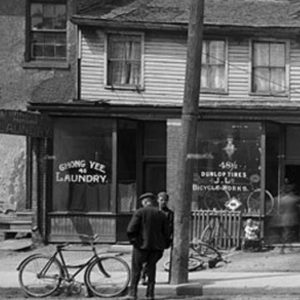 The early Chinese worked in laundries. Why was this such a popular business among the Chinese? First, there was a huge demand from people who needed to have their clothes washed and ironed. There were no washers and dryers in those days. Secondly, no one else wanted to go into the laundry business. Sixteen to eighteen hours a day, six to seven days a week, were the norm, and not much money was earned despite the long hours and hard work. Thirdly, the Chinese could open a laundry with little money, inexpensive equipment, and simple supplies. Rent money was saved by living at the back of the laundry. Not only that, they could be their own bosses, hire their relatives and friends, and not have to worry about discrimination from white employers. With no training, education, or command of the English language, the Chinese found a niche business.
The early Chinese worked in laundries. Why was this such a popular business among the Chinese? First, there was a huge demand from people who needed to have their clothes washed and ironed. There were no washers and dryers in those days. Secondly, no one else wanted to go into the laundry business. Sixteen to eighteen hours a day, six to seven days a week, were the norm, and not much money was earned despite the long hours and hard work. Thirdly, the Chinese could open a laundry with little money, inexpensive equipment, and simple supplies. Rent money was saved by living at the back of the laundry. Not only that, they could be their own bosses, hire their relatives and friends, and not have to worry about discrimination from white employers. With no training, education, or command of the English language, the Chinese found a niche business.
Most of their customers were non-Chinese. Many Chinese laundrymen did not know how to write English so they wrote Chinese descriptions of the customers, instead of their names, on the brown paper laundry packages. Soon, laundry tickets were given as receipts. George Heron in his memoir guessed what would happen if a customer lost his ticket, “I can imagine the trouble they would have had collecting their goods, trying to convince someone who spoke little or no English.”
Excerpted from The Chinese Community in Toronto: Then and Now by Arlene Chan, published by Dundurn Press. Copyright © 2013 by Arlene Chan
Image credit: City of Toronto Archives
